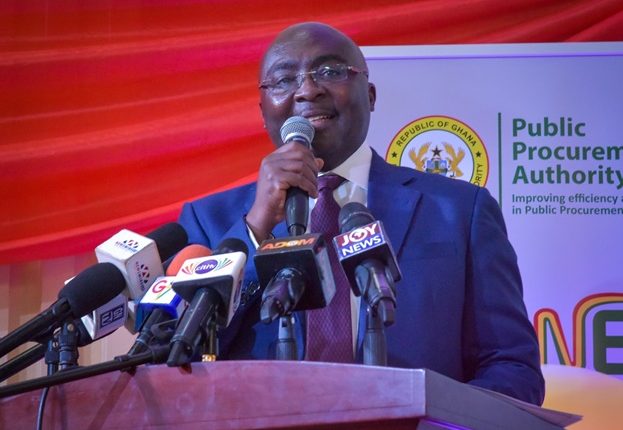Ghana has become the first country in the West Africa sub-region to establish an electronic procurement system for the public sector.
This was announced by the Vice President of the Republic, Dr Mahamudu Bawumia, when he launched Ghana’s Electronic Procurement System (GHANEPS) in Accra on Tuesday, 30th April, 2019.
The e-procurement system is designed to address corruption in procurement procedures by minimising human face-to-face interaction, and increase productivity for both Procurement Officers and Service Providers as all manual procurement process and procedures are automated.
As well, Service Providers (Suppliers, Consultants and Contractors) will be able to respond to tenders, seek clarifications and other information from the comfort of their offices via the internet. The time and risks associated with tender submissions will be considerably reduced and/or eliminated.
In addition, there will be a considerable reduction of the use of paper associated with tendering, greater ease in monitoring and audit, increased accuracy in reporting and statistics, increase in participating suppliers in public procurement, increase in the number of tender responses and a reduction in Procurement lead times.
In line with international best practice, Ghana’s E-procurement system uses the Open Contracting Data Standards (OCDS) for its reporting and display of information. In this format, information is available at each stage of the procurement process.
Phase 1 of the e-procurement system has begun with five (5) government agencies – Department of Feeder Roads, Ghana Cocoa Board, Ghana Health Service, Koforidua Technical University and Tema Metropolitan Assembly – with Phase II, covering all 34 Ministries, Public Universities, Metropolitan Assemblies and some selected Departments and Agencies, expected to start at the end of June 2019.
The phased roll-out is expected to continue until the end of 2020, during which all public entities will be expected to use the e-procurement system for their procurement activities, according to officials of the Public Procurement Authority.
Speaking at the launch in Accra, Vice President Bawumia explained that government’s many-pronged digital interventions are aimed at moving Ghana into the digital age and making life easier for the ordinary Ghanaian.
“At the heart of government’s drive to digitize our economy is the need to facilitate the delivery of government services, formalize the economy, de-risk the business environment, and above all deal with matters of corruption,” Vice President Bawumia indicated.
“As a government, we are fully committed to improving transparency and efficiency in the procurement process. With this end-to-end modular e-procurement system and its integration with other government systems – such as Register General’s Department, Ghana Revenue Authority, Ghana E-Payment Portal, etc., and eventually with GIFMIS- we get closer to this objective.”
Commending the Board, Management and Staff of the Public Procurement Authority as well as the Minister and staff of the Ministry of Communications, Vice President Bawumia said their efforts at tackling procurement fraud would save Ghana many productive man-hours and revenue lost through theft.
“Ghana is indeed entering a new dawn in public procurement. It will soon be a thing of the past where service providers have to travel distances to access tender documents, submit tenders or seek clarifications.
“Use of Tender Boxes will be history. Now your computer is your Tender Box. Civil Societies and for that matter the general public no longer have to go to public entities requesting information on its procurement activities… The e-procurement system is another step aimed at curbing the canker of corruption in our public procurement processes.”
Some experts estimate that Procurement breaches make up close to 90% of corruption cases, and the adoption of e-procurement could save countries up to 2% of GDP. Ghana could thus save $100m annually, according to the Ghana Country Director of the World Bank, Mr Henry Kerali.


Comments are closed.